
-
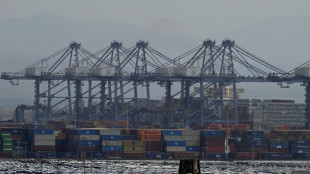 Stocks drop after US economy contracts amid tariffs turmoil
Stocks drop after US economy contracts amid tariffs turmoil
-
US economy unexpectedly shrinks on import surge ahead of Trump tariffs
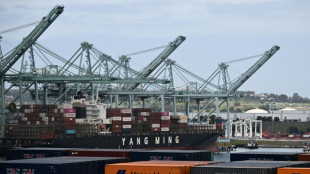
-
 Dravid says Suryavanshi, 14, needs support from fame
Dravid says Suryavanshi, 14, needs support from fame
-
Arsenal can win 'anywhere' says Merino after Champions League defeat by PSG

-
 Bangladesh crush Zimbabwe by an innings in second Test
Bangladesh crush Zimbabwe by an innings in second Test
-
Swiatek recovers against Keys to reach Madrid Open semis

-
 Spurs captain Son out of first leg of Europa League semi-final
Spurs captain Son out of first leg of Europa League semi-final
-
US economy unexpectedly shrinks in first three months of Trump presidency
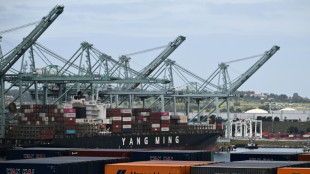
-
 India to ask caste status in next census for first time in decades
India to ask caste status in next census for first time in decades
-
Burkina junta rallies supporters after claimed coup 'plot'

-
 Forest owner Marinakis steps back as European qualification looms
Forest owner Marinakis steps back as European qualification looms
-
US economy unexpectedly contracts in first three months of Trump presidency
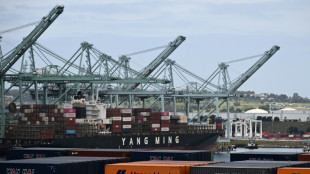
-
 Bilbao will give 'soul' to beat Man United: Nico Williams
Bilbao will give 'soul' to beat Man United: Nico Williams
-
Sweden arrests teen after triple killing

-
 Pakistan says India planning strike after deadly Kashmir attack
Pakistan says India planning strike after deadly Kashmir attack
-
Cardinals lay groundwork for conclave, hope for quick vote

-
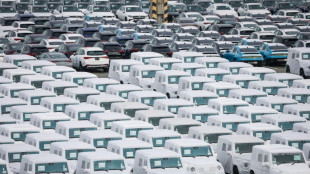 More automakers drop earnings guidance over tariffs
More automakers drop earnings guidance over tariffs
-
William and Kate release romantic image on low-key anniversary

-
 Israel says strikes Syria to shield Druze as clashes spread
Israel says strikes Syria to shield Druze as clashes spread
-
Champions Cup format 'not perfect' says EPCR boss

-
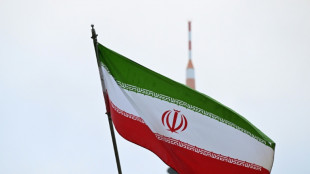 Iran hangs man as Israeli spy after 'unfair' trial: activists
Iran hangs man as Israeli spy after 'unfair' trial: activists
-
Stock markets mostly rise ahead of US economic data, tech earnings
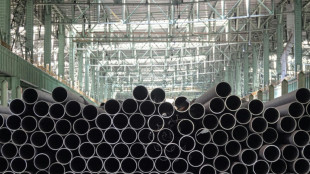
-
 German growth better than expected but tariff turmoil looms
German growth better than expected but tariff turmoil looms
-
Sinner denies beneficial treatment in doping scandal ahead of Rome return

-
 Eurozone economy grows more than expected despite US tariff turmoil
Eurozone economy grows more than expected despite US tariff turmoil
-
Toulouse hooker Mauvaka out of Champions Cup semi

-
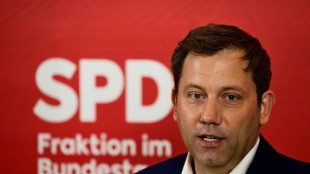 Germany's next finance minister, 'bridge-builder' Lars Klingbeil
Germany's next finance minister, 'bridge-builder' Lars Klingbeil
-
Mehidy century puts Bangladesh in command against Zimbabwe

-
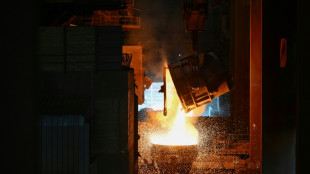 Steelmaker ArcelorMittal warns of uncertainty
Steelmaker ArcelorMittal warns of uncertainty
-
Vietnam's Gen-Z captivated by 50-year-old military victory

-
 Moroccan-based cardinal says Church does not need Francis 'impersonator'
Moroccan-based cardinal says Church does not need Francis 'impersonator'
-
US official tells UN top court 'serious concerns' over UNRWA impartiality

-
 Jeep owner Stellantis suspends outlook over tariffs
Jeep owner Stellantis suspends outlook over tariffs
-
New Zealand, Phillippines sign troops deal in 'deteriorating' strategic environment

-
 Aston Martin limits US car imports due to tariffs
Aston Martin limits US car imports due to tariffs
-
Pakistan says India planning strike as tensions soar over Kashmir

-
 Australian triple-murder suspect allegedly cooked 'special' mushroom meal
Australian triple-murder suspect allegedly cooked 'special' mushroom meal
-
Most stock markets rise despite China data, eyes on US reports
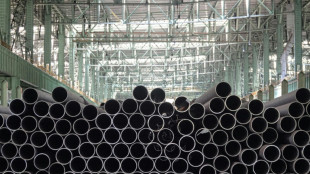
-
 TotalEnergies profits drop as prices slide
TotalEnergies profits drop as prices slide
-
Volkswagen says tariffs will dampen business as profit plunges
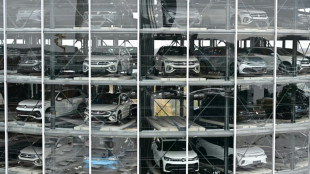
-
 Jeep owner Stellantis suspends 2025 earnings forecast over tariffs
Jeep owner Stellantis suspends 2025 earnings forecast over tariffs
-
China's Shenzhou-19 astronauts return to Earth

-
 French economy returns to thin growth in first quarter
French economy returns to thin growth in first quarter
-
Ex-Premier League star Li Tie loses appeal in 20-year bribery sentence
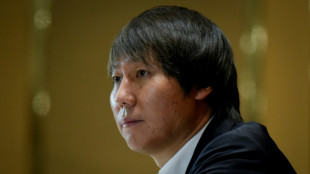
-
 Belgium's green light for red light workers
Belgium's green light for red light workers
-
Haliburton leads comeback as Pacers advance, Celtics clinch

-
 Rahm out to break 2025 win drought ahead of US PGA Championship
Rahm out to break 2025 win drought ahead of US PGA Championship
-
Japan tariff envoy departs for round two of US talks
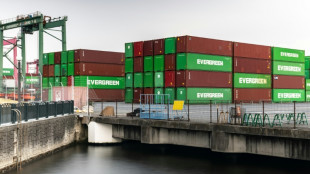
-
 Djurgarden eyeing Chelsea upset in historic Conference League semi-final
Djurgarden eyeing Chelsea upset in historic Conference League semi-final
-
Haliburton leads comeback as Pacers advance, Pistons stay alive


German growth better than expected but tariff turmoil looms
Germany's struggling economy grew faster than expected at the start of the year, data showed Wednesday, in a boost for the incoming government of conservative Friedrich Merz even as US tariffs threaten to derail the nascent recovery.
Gross domestic product (GDP) in Europe's biggest economy expanded 0.2 percent from January to March compared to the previous quarter, according to provisional figures from federal statistics agency Destatis.
The expansion, driven by improving consumption and investment, was better than analyst forecasts and meant Germany dodged a recession -- defined as two straight quarters of negative growth -- after a contraction at the end of last year.
It was rare good news for the eurozone's traditional growth engine which has been battling a manufacturing slowdown, rising costs and weak demand in key overseas markets, prompting the economy to shrink in both 2024 and 2023.
The improving picture will come as a relief for incoming chancellor Merz as he prepares to take office next week, with the dire state of the economy one of his most pressing challenges.
Still, any celebrations are likely to be short-lived, with economists predicting that Germany will be hit hard later in the year by US President Donald Trump's tariff blitz.
"This should not be interpreted as the beginning of a sustainable recovery," said Dirk Schumacher, chief economist at German public lender KfW, warning of "uncertainty regarding American economic policy".
The Ifo institute said that the economy likely benefited in the first quarter as companies in the United States -- Germany's top trading partner last year -- rushed to import goods before tariffs kicked in this month, and the levies would weigh on growth later in 2025.
The European Union is currently facing a 10-percent tariff on its exports to the United States as part of Trump's hardball trade agenda. He earlier announced a 20-percent rate on the bloc but then paused the higher levies -- on the EU and many other trading partners -- to allow for talks.
- Deep-rooted problems -
In a further sign of economic weakness for Germany, data released Wednesday showed unemployment edging up to 6.3 percent in April -- the second straight monthly increase.
Following two years of contraction driven by surging energy prices after Russia invaded Ukraine and post-pandemic supply chain woes, the German economy was expected to start making a modest recovery this year.
But the government last week downgraded its growth forecast for 2025 to zero, blaming Trump's sweeping tariffs, in line with economic institutes who have also been slashing their estimates.
Highlighting the economy's woes, Volkswagen and Mercedes-Benz -- two major players in Germany's flagship auto industry -- reported sharp falls in first-quarter profits Wednesday, and warned of the impact of US tariffs.
Merz has vowed a barrage of measures to boost the economy, ranging from vastly increasing public spending to lowering corporate taxes and energy costs.
He has already succeeded in leading efforts to push changes to Germany's restrictive debt rules through parliament, paving the way for massive extra outlays on defence and infrastructure, which economists say should boost the economy.
But it is expected to take some time before these measures are implemented and have any kind of impact.
And ING economist Carsten Brzeski warned the spending plans, "impressive as they might be, will do very little to improve the economy's competitiveness".
"Modern infrastructure is essential for one of the world's largest economies, but it doesn't inherently drive innovation, sector transformation, or new growth opportunities."
L.Mason--AMWN